Yesterday, June 23rd, marked one month before the opening of the “cursed” Tokyo 2020 Olympics and hundreds of residents marked the occasion by holding a protest in front of the Tokyo Metropolitan Government Headquarters. As the delta variant of the novel-coronavirus spreads rapidly and public health concerns are rising, the clamor to call-off the Olympics is increasing. Tokyo Governor Yuriko Koike was not there to hear the voices of protest yesterday; she is in the hospital due to “fatigue.” The government swears it’s not due to COVID-19 and of course, we believe them.
(Update) The protest will begin at 18:00 by the front entrance on the second floor of the Tokyo Metropolitan Government Building No.1, and will migrate to the Shinjyuku ALTA building at 19:00. Further guidelines for the protest can be found at the hangorin group’s (anti-Olympics) tumbler page. The organization will also livestream the protest on YouTube from 18:00.
In collaboration with this domestic demonstration, international anti-Olympic organizations in Los Angeles, U.S., Pyeongchang, South Korea, and ironically Paris, France, where the IOC was born, are scheduled to hold simultaneous protests.
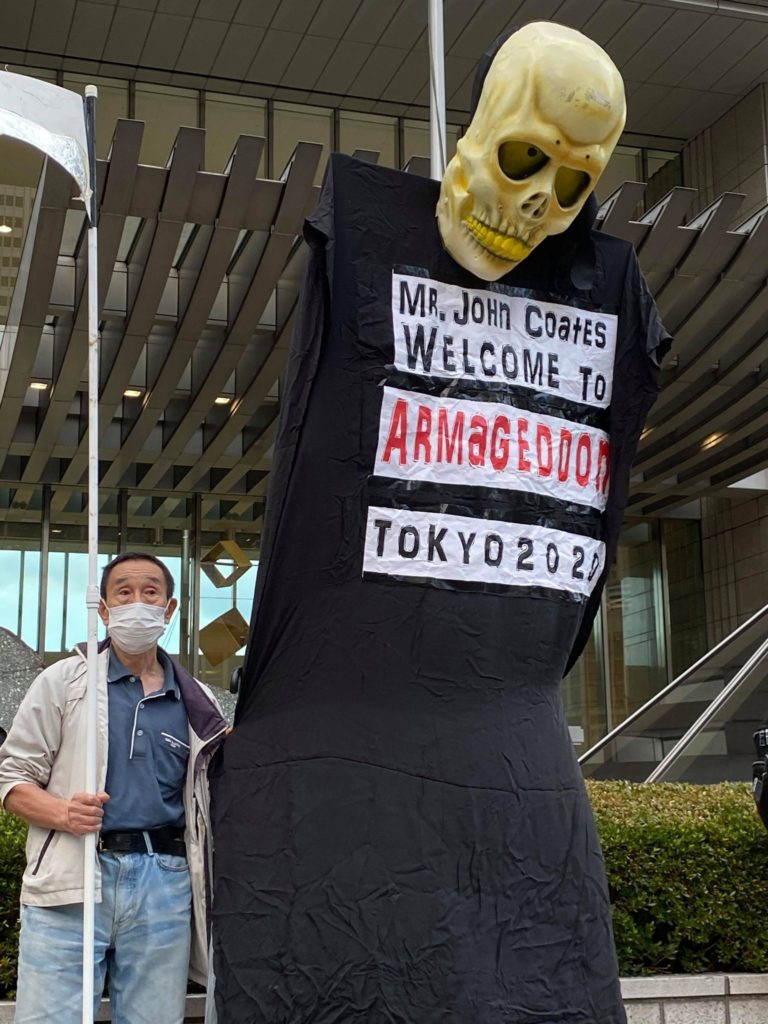
In a decision described as “incomprehensible” by the Japan Doctors Union, and “a pharisaical escapade” by Olympic sponsor newspaper, Asahi Shinbun, the Japanese government, JOC and IOC announced on the 21st that up to 10,000 people would be allowed to attend the games at the national stadium. The 10,000 is a per game not the total. Do the math and you’ll be shocked.
Furthermore, the government is considering permitting an audience of 20,000 for the opening ceremony and selling alcohol in the stadium.
JoongAng Ilbo, a South Korean daily newspaper, cited in their report a Kyoto University research paper which estimated an increase in population movement of 10% to 15% due to the games. The paper further forecast that the 10% mobility hike could produce 10,000 more COVID-19 infections by August 25th than a spectator-free Olympics. Most medical experts, have suggested that the Tokyo Olympics should be cancelled during a pandemic. One expert said that the mixture of variants of COVID19 brought into Japan might even result in a super-deadly strain, The Tokyo Olympics variant.
It is not only physicians and civilians that have raised concerns about the games’ risk to public health. The government’s new virus subcommittee stated in a report published by the committee chairman, Shigeru Omi, that “holding events without any spectators involves the least amount of risk, so that would be ideal.”
This article will be updated throughout the day as Chihiro Kai reports from the Tokyo Metropolitan Government Building demonstration near Tochomae and Shinjyuku station.
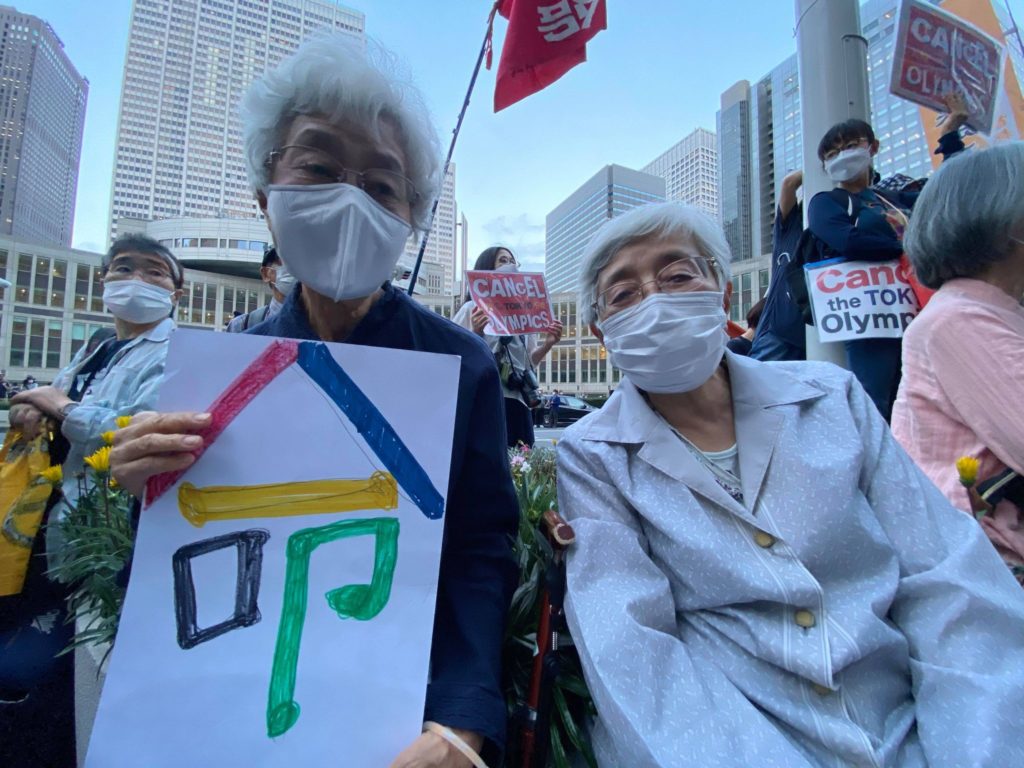
(Update)
A pervasive trend of nationalism (breadcrumbs leading back to the 90s)
17:30 p.m.
A roughly 1:1 ratio of early protesters and reporters assembled by the front entrance of the Tokyo Metropolitan Government Building No.1.
Among the tripod tinkering press and prepping protest organizers, a former high school teacher specializing in ethics and world history sat on a raised concrete flower bed lining the far side of the pedestrian path. A mild cowlick sprouted some of his grey strands upwards, and his light-blue dress shirt was buttoned to the top despite the nearly 80% humidity, including the collar buttons. He was a Rousseau fan when it came to teaching the social contract but he understood that most teenagers despised the subject of ethics.
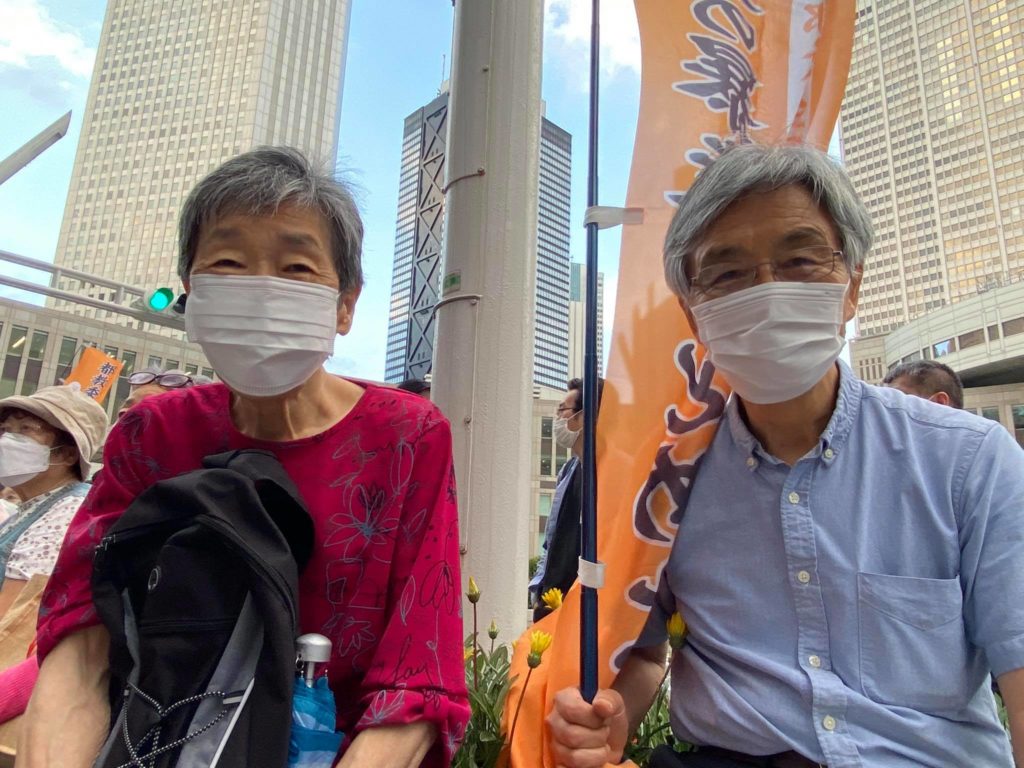
Hidekiyo Watabe’s calm yet commanding presence has helmed teacher protests against what he described as the nationalist agenda of the Tokyo Metropolitan Board of Education for decades. A few hours prior to the anti-Olympics protest, he and his teachers organization had delivered a letter addressed to the Tokyo Metropolitan Board of Education Superintendent, Yuuji Fujita, requesting the board stop the “Olympic and Paralympic Education” program that has been practiced in all Tokyo public schools since 2016.
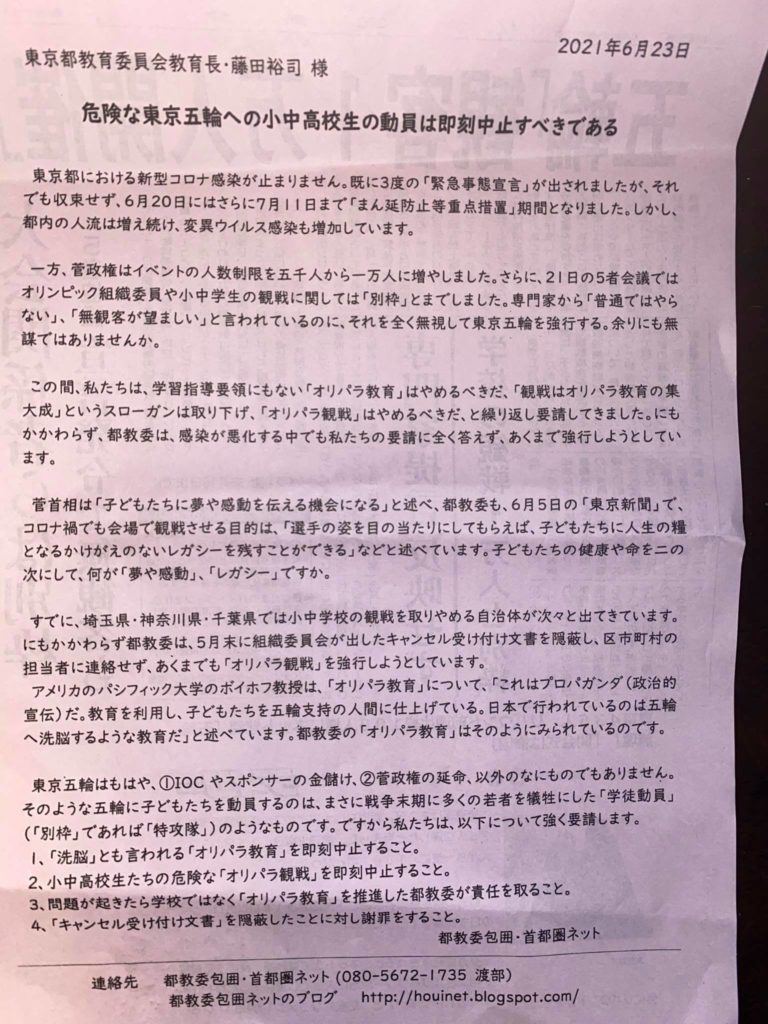
The board-crafted program schedules one hour of class time a week, for 35 weeks per year, to nurture five Olympic “qualities” in children to ensure they have the optimum experience from the games. One of the “qualities” raising a red flag for the teachers is “the acknowledgement and pride in being Japanese,” which Watabe and other public school educators fear has been brainwashing Olympic optimism and nationalism into their students despite the pandemic.
“I fear that history is repeating itself in these subliminal amendments to public education guidelines that emphasize “patriotism” cloaked as nationalism. I remember history and pre-war sentiments. That’s why I particularly fear for the children,” Watabe said. “There’s a trend of nationalist agenda running through these school guidelines, and it goes back up to 2006 and 2003 when paying respect to the flag was mandated and “patriotism” was included as a basic educational philosophy.”
In 1995, Watabe organized a sit-in outside the National Diet Building protesting the board of education’s plans to mandate public school educators to rise, face the flag and sing the adopted national anthem, “Kimi ga yo” at all official school ceremonies. The mandate was enforced nationwide in 2003. Although the Tokyo District Court initially ruled that teachers were not obligated to sing the national anthem, this decision was overturned by the Tokyo Supreme Court in 2011, a ruling criticized by the Japan Federation of Bar Associations.
Despite the mandate becoming effective on October 23, 2003, by the end of the year Asahi Shinbun reported 203 teachers had faced disciplinary action for failing to follow the board’s guidelines. Disciplinary action ranges from a pay decrease, suspension to dismissal with the severity of the punishment increasing per infraction.
“I was punished every year from 2003 for disobeying the national anthem mandate,” Kimiko Nezu, a retired home economics teacher said. “The same underlying nationalism pervades this Olympics.”
Three years later in 2006, the “Fundamental Law of Education,” a broad philosophical guideline for public schools in the country, was revised to include a new article section instructing curriculums to nurture “a respect for tradition and culture, and love for this country that has cultivated them…” As of 2021, certain words have changed in this rule however, the general message remains unchanged.
“I believe the Liberal Democratic Party has attempted to sew nationalistic sentiments in a broad swath of the electorate in the hopes that following the Olympics and the general home-country patriotism it generates, the people will be more open to certifying a constitutional amendment to reinstate the military in a final public referendum,” Nezu said.
Watabe said he also predicts the LDP aims to use the Olympics to increase popularity for their more conservative policies.
“As an educator, you never ever want to see or contribute to your students going to war. I’ve consistently protested the Metropolitan Board of Education precisely so that it doesn’t happen again,” he said.
18:20 Tokyo Metropolitan Government Building
Two election campaign vans with megaphones and poster boards displaying a political candidate’s face attached to their roofs parked across the street from the anti-Olympics demonstration. “Anti-Mask” and “Vaccines are dangerous” slogans were printed in large white, yellow and red font. The two vehicles were driven by a right-wing political activist, Masayuki Hiratsuka and his team from the Popular Sovereign Party, which he founded in February, 2020.
From inside his car, Hiratsuka counter-protested the anti-Olympics demonstration using false information which claimed that masks were a government propaganda to oppress freedom of expression and vaccines were ineffective, foreign money-making schemes.
Hiratsuka’s vans followed the protestors as they marched from the Tokyo Metropolitan Government Building towards the JR Shinjyuku station. At times, the slogans and speeches broadcast by the anti-Olympics demonstrators and Hiratsuka were indistinguishable as their simultaneous megaphone usage converged into a deafening roar of word spaghetti.
Up until the first intersection crossed by the marchers, the Tokyo Metropolitan Police had barely interacted with the protest other than giving people the occasional reminder to remain on the pedestrian pathway. However, as the 1,000 and growing protestors waited in groups to cross the light, the Popular Sovereign Party’s vans remained at the intersection.
19:35
The protestors’ irritation towards Hiratsuka’s scientifically false and inflammatory speech suddenly came to a boil when the candidate made a xenophobic statement that COVID-19 was fake propaganda projected onto Japan by “gaijin,” a racial slur for foreigners, and that all foreigners and immigrants should go back to their home countries. In response, a White woman banged once on the driver’s side window of the van carrying Hiratsuka. This sparked further outrage from protestors as a crowd of men gathered next to the car and shouted back at the right-wing candidate. From then on, the main role of the Tokyo Metropolitan Police was to behave as bodyguards for Hiratsuka’s team, surrounding his vehicles in a human barrier whenever they were stationary.
“If you are in favor of the Olympics, that’s your opinion. But, Corona has killed so many people, and has destroyed the lives of those who didn’t catch it themselves,” the woman, who chose to remain anonymous, said. “And then, there’s people like this who without any scientific background, these are just random politicians, saying shit.”
No arrests were made in regard to this brief altercation.
20:22
Rieko Sudou, a member of the one of the protest organizers, “Hangorin no Kai” (the anti-Olympics committee) unified the 1,000 plus strong march with rhythmic slogans as her voice is broadcast over multiple megaphones interspersed throughout the procession.
“We are not just calling for the Tokyo 2020 Olympics to be cancelled. We want the Olympics and the IOC abolished,” Sudou said. “Our message is compounded by the human toll suffered due to the pandemic. However, problems with the IOC and the Olympic organizing system have been there well before 2020.”
The Hangorin no Kai has been calling for the Tokyo Olympics to be terminated since before the city was selected to host the games in September, 2013.
“You see with each Olympics, regardless of the host country, and with mega-sports events in general, that vulnerable people are displaced from their homes or livelihood to build larger stadiums,”she said. “The government can claim the games will revitalize the economy in general. Most of the profits stay in the pockets of the affluent and politically influential, and the general public rarely benefits financially from the Olympics.”
Fellow Hangorin no Kai member, Tetsuo Ogawa said he thinks this protest’s unprecedented attendance rate is a reflection of just how popular anti-Olympic sentiments are in country.
“This is the largest protest we’ve had so far. It used to be just a hundred people or so per event. And today’s numbers were eight to 10 times more than that,” Ogawa said. “Perhaps with only one month left until the games are scheduled to begin, people are growing really apprehensive and nervous about the forecast public health repercussions.”
As to whether today’s protest will actually convince the JOC and IOC to postpone or cancel the games, Sudou said people must keep trying to reach their elected officials regardless of the probability for success.
“The politicians and IOC know how we feel. They are waiting and hoping we will give up. That’s why we can’t,” she said
The protest concluded at approximately 21:30.
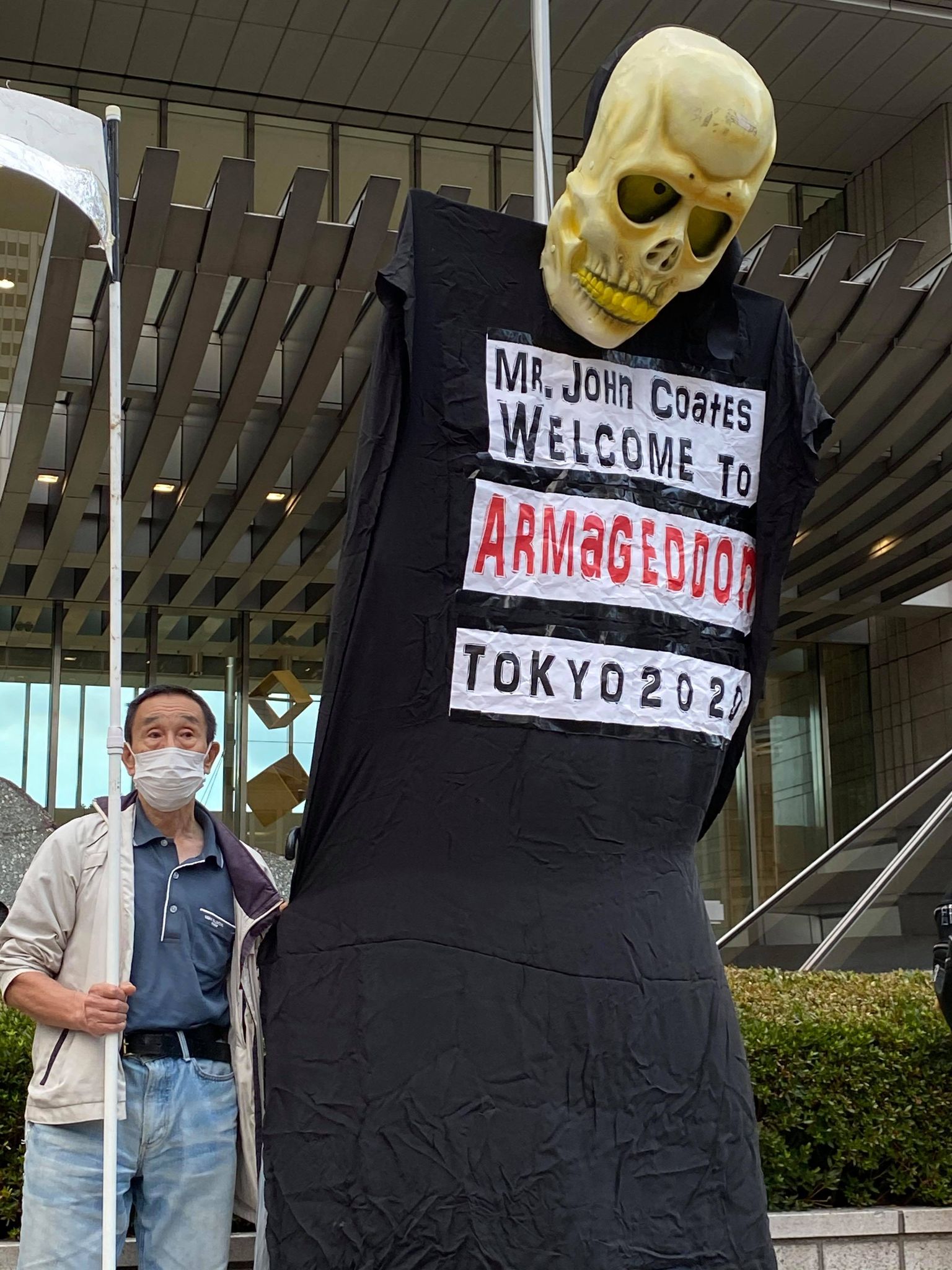
[…] was also present on June 23, “No Olympics” protest in Shinjuku He made scientifically incorrect and genophobic statements calling COVID-19 nothing more than […]
[…] was additionally current on the June 23, “No-Olympics” protest in Shinjuku the place he made scientifically false and xenophobic statements calling COVID-19 nothing greater […]
[…] was also present at the June 23, “No-Olympics” protest in Shinjuku where he made scientifically false and xenophobic statements calling COVID-19 nothing more than […]
[…] Their opposition was initially driven in part by the displacement of people experiencing homelessness to make way for Olympic venues. […]
[…] Their opposition was initially driven in part by the displacement of people experiencing homelessness to make way for Olympic venues. […]
[…] Their opposition was initially driven in part by the displacement of people experiencing homelessness to make way for Olympic venues. […]